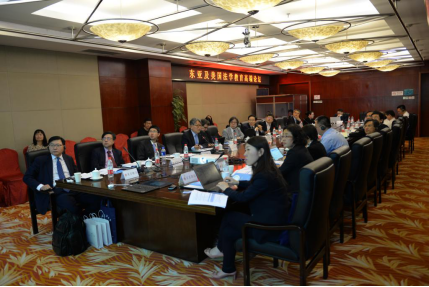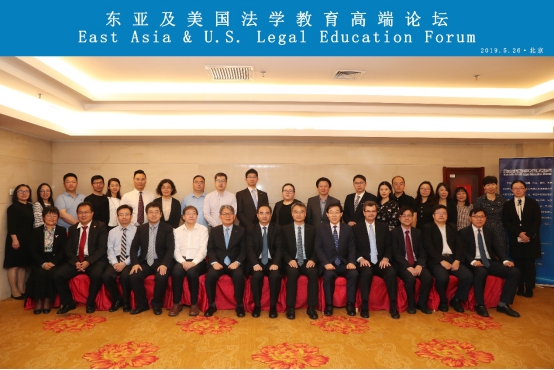On May 26, 2019, the “East Asia&U.S. Legal Education Forum” took place at Jingyi Hotel in Beijing. This event was sponsored bytheSchool of Juris MasterofChina University of Political Science and Law (CUPL)and co-organized by Waseda University Clinical Legal Education Institute and the China, Japan, and Korea Cooperative Research Center (Law) of Renmin UniversityofChina.

The Forum was graced by the presence of over 50 attendees, including Prof. Lloyd Tom Wilson (Director of Asian Law Center, Robert H. McKinney School of Law, Indiana University); Prof. Shigeo Miyagawa (Director of Waseda University Clinical Legal Education Institute); Lawyer Atsushi Shiraki (A practice teacher in Legal Clinic,Waseda University); Prof. Kim Soon-suk (Dean of Graduate School of Law, Chonnam National Universityof Korea; President of Korea Association of Graduate Schools of Law; President of Korean Commercial Law Society); Prof. Moon Jae-wan (Dean of Law School, Hankuk University of Foreign Studies); as well as preeminent professors andrepresentatives ofstudents and teachers from law schools of top domestic universities.
In his remarks delivered at the Opening Ceremony, Prof. HUAN Jin was hopeful that this Forum would provide an opportunity for experts toconductexchange and discussions, find consensus in legal education, and explore laws in legal education, in a bid to do better in legal education and in the cultivation of high-caliber legal personnel. The Forum fell into three units for keynote speeches.
The keynote of the first unit was “Path for Reforms in Legal Education”. First of all, Prof. HUANG Jin delivered a report titledNature, Objective, and Path of Legal Education. Prof. Lloyd Tom Wilson sharedtheissues in the reforms of legal education in the United States. Prof. Kim Soon-suk introduced Korea’s reforms in legal education, with a focus on the law school system and its change of the country. Lawyer Atsushi Shiraki shared the teaching methods and experience in legal practices of Japan. In addition, he introduced the Legal Clinic of Waseda University as well as thelegalgraduate school system of Japan. Prof. Moon Jae-wan delivered a report titledOpening-up of Legal Service Market and Legal Education ReformsinKorea. LU Jiangnan, Deputy Secretary of Peking University Law School, introduced the educational reforms of the school in terms of the structure and size of students, practices in curriculum reforms as well as the direction of future work, among others. Prof. JIAO Hongchang, Dean of SchoolofLaw of China University of Political Science and Law (CUPL), and Prof. WU Rihuan, Director of CUPL Korean Law Research Center, shared theirviewswith regard to the speeches of the aforesaid experts.
The keynote of the second unitwas “Practices in the Legal Education Reforms of China”,which wasmoderated by Prof. GAO Shengping. Prof. YU Fei, Deputy Dean (presiding over work) ofCivil, Commercial, and Economic LawSchool,CUPL, delivered a speech titledUnity in Study in Law School and Legal Practicein Thinking Method: Explorations in Research andStudy Course forBasic Cases in Right of Claim. Prof. WANG Chenguang, a former dean of Tsinghua University School of Law, held that the legal education of China should pivot away from current teaching modelfeatured withteachingbyprinciplestothe cultivation of practical talent. Meanwhile, the ultimate goal and evaluation system of the entire legal education shouldalsobe adjusted so as to improve the overall qualities and capabilities of the faculty, the professor stressed. Prof. LIU Fei, Dean of China-EU School of Law (CESL) at CUPL, introduced the cultivation model of CESL. Prof. YIN Fei, Dean of Law School of Central University of Financeand Economics (CUFE), introduced the cultivation model and school-running characteristics of financial and economic universities. Prof. TIAN Shiyong, Director of Legal Education Research and Evaluation Center of CUPL, noted that China should put in place complete legal provisionsso asto more effectively align universities with practicing sectors in the cultivation of legal talent. Prof. WANG Haiyan (Dean of CUPL School of Criminal Justice), LIU Zhihui (Dean oftheSchool of Juris Master), and Prof. XIN Chongyang withtheSchool of Juris Master summarizedtheissues in juris master education of China, case teaching in juris master education, as well as the cultivation objective of inter-disciplinary talent.
The keynote of the third unit was “Objectives and Directions for Reforms in Legal Education of East Asia and the United States”,which wasmoderated by Prof. XIE Zhiyong, Dean of CUPL College of Comparative Law. Prof. Shigeo Miyagawa delivered a report titledInfluence of United States Legal Education on Reforms in Legal Education of Japan. Prof. DING Xiangshun, Director of the China, Japan, and Korea Cooperative Research Center (Law) of China Renmin University, delivered a report titledDifferent Paths to Legal Education Reforms in Northeast Asia. In his report, Prof. HU Huisheng with the University of Hong Kong emphasized the importance of legal professional ethics course. JIANG Huiling, Deputy President of National Judges College, and Prof. WANG Chenguang, a former dean of Tsinghua University School of Law, shared theirviewswith regard to the speeches of the aforesaid experts.
The Closing Ceremony was moderated by Deputy Dean LIANG Min and addressed by Dean XU Shenjian. In his closing speech, XU Shenjian thanked the speakersandpanelistswho shared their valuable experience in the legal education and development of their own countries as well as their recommendations regarding the cultivation of legal talent. He thought that these experienceandsuggestions will helptheSchool of Juris Master better explore the laws for talent cultivation and cultivate legal talent of bothabilityand integrity. In the meantime, XU was hopeful that China could find a path to its legal education and that this Forum would help strengthen academic exchanges and friendship among different countries and facilitate healthy development of legal education.
